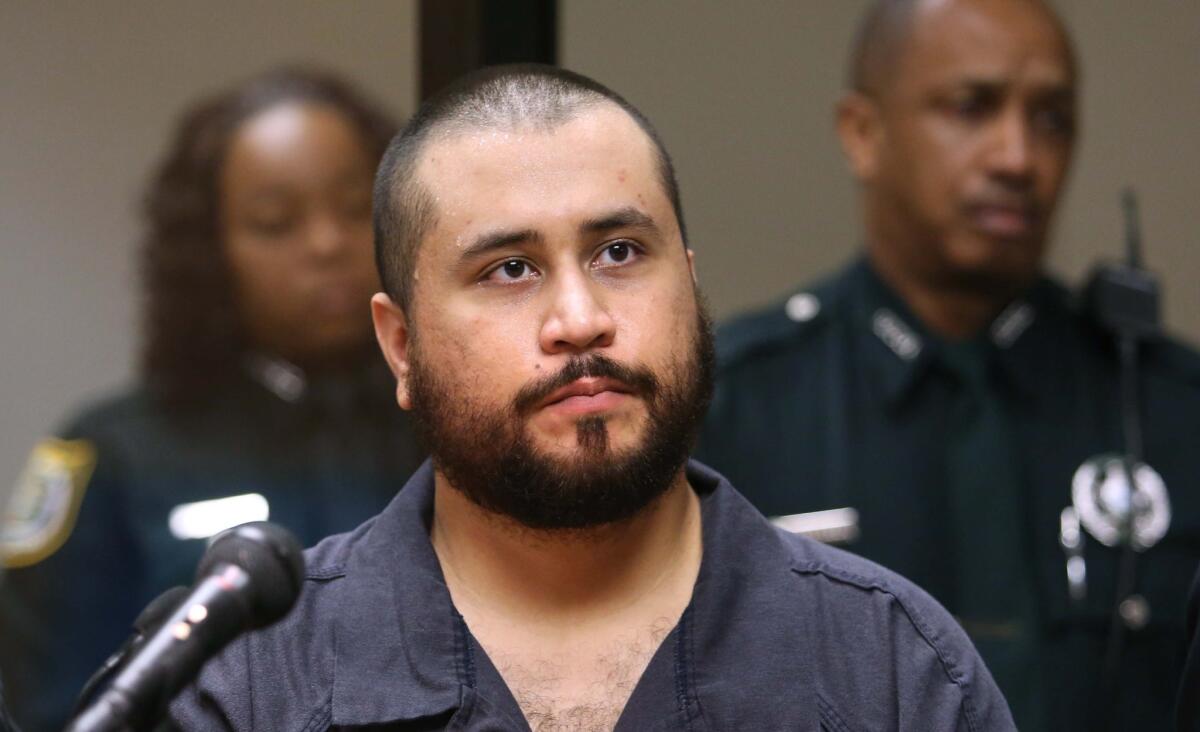No federal charges for George Zimmerman in killing of Trayvon Martin

- Share via
Reporting from Washington — The Justice Department said Tuesday that it was closing its investigation into the shooting death three years ago of Florida teenager Trayvon Martin without filing criminal charges against former neighborhood watch volunteer George Zimmerman.
Justice Department officials said it was impossible to prove that Zimmerman “willfully” violated the black 17-year-old’s civil rights when he pulled the trigger during a struggle in February 2012.
The announcement ends the high-profile federal investigation into a shooting death that set off a national debate about race, guns, so-called stand-your-ground laws and self-defense.
“The death of Trayvon Martin was a devastating tragedy,” Atty. Gen. Eric H. Holder Jr. said in a statement. “It shook an entire community, drew the attention of millions across the nation, and sparked a painful but necessary dialogue throughout the country. Though a comprehensive investigation found that the high standard for a federal hate-crime prosecution cannot be met under the circumstances here, this young man’s premature death necessitates that we continue the dialogue and be unafraid of confronting the issues and tensions his passing brought to the surface.”
Martin was visiting his father and his father’s girlfriend at a gated community in Sanford, Fla., when he went to a convenience store in the rain. Wearing a hoodie, he was on his way home when Zimmerman confronted him.
His death prompted angry demonstrations and renewed racial tensions in America. President Obama said at the time, “If I had a son, he’d look like Trayvon.”
The decision not to prosecute Zimmerman was widely expected and illustrated the legal challenges federal officials often face in bringing such civil rights cases.
As Holder begins to wrap up his tenure as the nation’s top law enforcement officer, he is expected to announce shortly the results of another high-profile federal investigation — into the shooting of another unarmed African American, Michael Brown, by a white policeman in Ferguson, Mo., in August.
Like Zimmerman, Officer Darren Wilson is expected to avoid federal prosecution, although a concurrent investigation of possible civil rights violations by the Ferguson Police Department is likely to result either in an agreement with the city to reform its practices or a federal lawsuit.
The Justice Department is also investigating the July death of Eric Garner, who was put into an apparent chokehold while New York police officers tried to arrest him on suspicion of illegally selling cigarettes on Staten Island.
On Tuesday, prosecutors met with the Martin family and their lawyer, Benjamin Crump, in Miami to inform them of the decision. Crump told the Associated Press the decision “was a bitter pill to swallow.”
“What they told his family and I was that, because Trayvon wasn’t able to tell us his version of events, there was a lack of evidence to bring the charges. That’s the tragedy,” Crump said.
Because Zimmerman was a civilian who said he was on the lookout for burglars in his neighborhood, the standard of proof for federal civil rights charges was even higher than it is for the Ferguson and Staten Island police officers, legal experts said.
The Florida case was “a hate-crime investigation into whether he shot him because of his race,” said William Yeomans, an American University law professor and a former top Justice Department civil rights official. “The Ferguson and Staten Island cases are about whether police used excessive force.”
Justice Department officials said they would have had to prove that Zimmerman knew his actions were illegal and committed them anyway. “It is one of the highest standards of intent imposed by law,” the department said in a statement.
Yeomans agreed: “It should have been fairly clear from early on that charges were unlikely, barring some undiscovered audiotape expressing racist intent.”
The Justice Department rejected criticism that it took too long to wrap up the Zimmerman investigation, saying it had to suspend the inquiry after he was charged in state court with second-degree murder. The department picked up the case again after he was acquitted in July 2013.
As part of the investigation, the government interviewed 75 witnesses and hired “an independent biomechanical expert” to assess Zimmerman’s version of the struggle.
The department said Zimmerman was investigated for violating a federal housing law that criminalizes “willfully using force or threat of force to interfere with a person’s federally protected housing rights on account of that person’s race or color.”
Officials also examined whether he violated another provision by “willfully causing bodily injury to a person because of that person’s actual or perceived race.”
Since the acquittal, Zimmerman made his way back into the public eye after three women complained to police that he had behaved aggressively toward them.
Zimmerman was arrested Jan. 9 in Lake Mary, Fla., after his girlfriend, Brittany Brunelle, told authorities that he had thrown a wine bottle at her. Zimmerman denied throwing the bottle and disputed her claim that he destroyed her cellphone.
Florida officials dropped aggravated-assault charges against Zimmerman after Brunelle recanted her story and refused to cooperate with the prosecution, state officials said.
In September 2013, Zimmerman was accused by his estranged wife, Shellie Zimmerman, of smashing an iPad during an argument at the home they had shared. She initially told a dispatcher her husband had a gun, but later said he was unarmed. No charges were filed because of lack of evidence.
Two months after that incident, Zimmerman was arrested on charges of aggravated assault, battery and criminal mischief after his then-girlfriend, Samantha Scheibe, said he pointed a gun at her face during an argument, smashed her coffee table and pushed her out of their house. Scheibe later decided not to cooperate and authorities dropped the case.
More to Read
Sign up for Essential California
The most important California stories and recommendations in your inbox every morning.
You may occasionally receive promotional content from the Los Angeles Times.















